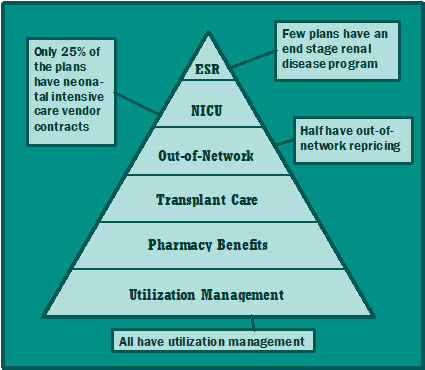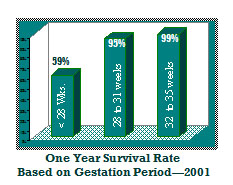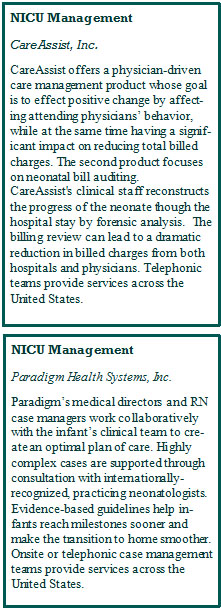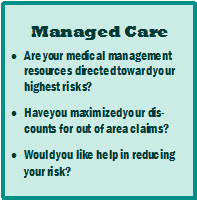When adults withdraw from opioids, we understand that withdrawal symptoms follow. The lesser-known fact is that infants who are born dependent on drugs have horrible withdrawal symptoms, too. The difference is that they are defenseless.
Read moreManaging NICU Costs
This article is part of a series of case studies—real stories of how managed care companies increased profits by using Summit Re’s resources to increase sales, decrease expenses, and manage claims. Neonatal intensive care unit (NICU) costs, especially for managed Medicaid populations, are one of the top drivers of overall healthcare costs for health plans. The major reasons for the high NICU costs are a significant variability in NICU care patterns, continuous advances in NICU care which is often reflected by higher cost of care, and longer lengths of stay as premature infants are born younger and surviving, albeit with more complex care needs. So what is a health plan to do?
Summit ReSources, the Summit Re managed care department, works closely with The Assist Group, an NICU management company that provides care management, forensic hospital bill audits and a new service called EvalAssist.
Situation: Increase in NICU costs 
One of our clients, ABC Health Plan, experienced a significant increase in NICU costs over the last 2 years without a corresponding increase in membership. Summit ReSources recommended that ABC Health Plan consider contracting with The Assist Group for EvalAssist. After an initial conversation with The Assist Group, ABC Health Plan decided to move forward with EvalAssist.
On-site assessment
The Assist Group provided an on-site assessment of ABC Health Plan's NICU medical management processes and staffing, NICU facility and professional contracts, and claims submission and payment processes. The Assist Group also provided care management services to several cases referred to The Assist Group by ABC Health Plan.
Over the course of several months, the staff of The Assist Group worked closely with ABC Health Plan to analyze claims data for the past two years and compare the billing patterns to the facility and provider contracts. The Assist Group neonatologists worked directly with the attending neonatologists to discuss the optimal treatment plans for cases referred to The Assist Group for care management oversight. The Assist Group also provided benchmark data regarding lengths of stay based on gestational age and birth weight.
Recommendations
After approximately 3 months, The Assist Group revisited ABC Health Plan to discuss the comprehensive assessment and provide recommendations to maintain or improve the NICU management while decreasing overall cost of care. The overall increase in cost that ABC Health Plan experienced over the last two years was determined to be related to several factors. The Assist Group identified each factor and made recommendations to improve financial outcomes while maintaining quality of care.
Changes
After the key factors for rising overall costs were identified, ABC Health Plan implemented the recommended changes. The Assist Group met with the attending neonatologists to discuss standards of NICU care, worked with ABC Health Plan’s provider contracting department to revise contracts as needed, and assisted the claims department in development of a forensic claims review process prior to payment of the claims.
NICU management has become costly and complex. If you are experiencing rising NICU costs and want to understand the reasons, it is sometimes cost effective to have an outside consultant, who is experienced in all aspects of NICU care, review your processes and possibly identify some factors that would make a difference in your bottom line.
Case studies from The Assist Group
The Assist Group specializes in solutions for catastrophic claims management and high-risk premature infants. Current products include CareAssist, a unique, physician-driven neonatal care management program, and ClinAssist, a powerful forensic audit and claims resolution service. The Assist Group has a proven track record for delivering financial value to clients. For more information about these products and services, please visit the company's website, www.assistgroup.com, or contact Debbie Stubbs, RN, MS, CCM at Summit Re, 260-407-3979.
CareAssist Success Story: 32 % Reduction in Length of Stay and $163,693 Savings
This twin boy was born at 25 weeks, weighing one pound, eight ounces. His mother used multiple illicit drugs throughout her pregnancy and on the day of delivery. He was on mechanical ventilation and in critical condition when referred to CareAssist on day of life (DOL) 17. This infant was not expected to survive due to his prenatal history, the circumstances of his birth, and extreme prematurity. The CareAssist neonatologist recommended an ethics committee consultation to discuss quality of life issues when it became evident on DOL 30 that he would survive. By then, this infant had the severest form of intraventricular hemorrhage, along with hydrocephaly and porencephaly. He also had severe chronic lung disease (CLD) and remained on mechanical ventilation well past his first month of life. His long-term prognosis was poor.
His final discharge disposition further complicated his clinical status as his mother continued to struggle with polydrug abuse and was considered unsuitable to care for him after discharge. CareAssist consistently recommended early discharge planning to allow a foster family to be trained to care for this infant upon discharge. This timely intervention allowed this baby boy to be discharged appropriately and safely.
Multiple oxygen weaning recommendations were made by the CareAssist neonatologist. This infant was eventually weaned to nasal cannula oxygen on DOL 59 and was discharged on low flow nasal cannula oxygen. This infant’s nutritional status was complicated by his CLD and tendency to tire during feedings secondary to his compromised pulmonary status. The steroids used to help wean him from supplemental oxygen also compromised his ability to gain weight. The CareAssist neonatologist emphasized to the treating team the importance of using high calorie formula and advised early developmental interventions through the use of non-nutritive sucking and OT/PT involvement in nipple training. As a result of these interventions, the infant was nippling all of his feedings at a corrected age of just 35 weeks.
The weekly care oversight by CareAssist for nearly three months ensured consistency in the implementation of this infant’s treatment plan. Due to CareAssist’s oversight, this infant was discharged safely to foster care 39 days earlier than originally anticipated. This resulted in a 32% savings of $163,693.
ClinAssist Success Story: $321,757 Savings
A 110-day confinement at a children’s hospital resulted in total billed charges of $1,287,027. ClinAssist reviewed approximately 10,600 line items of detailed charges. Utilizing the clinical expertise of ClinAssist’s neonatologists and nurses, ClinAssist performed a forensic review of the charges and identified the following exceptions:
- Room and board charges billed at incorrect levels of acuity
- Experimental pharmaceutical therapies
- Supplies and services incorrectly unbundled from the room and board charges
ClinAssist successfully achieved a $321,757 reduction in billed charges after the audit exceptions were presented to the facility. The account balance was adjusted to reflect the facility’s written agreement that the exceptions identified by ClinAssist were not payable charges.
Survey: Managed Care Programs Accessed by HMOs
To ensure that our services match the needs of our clients, we conducted a survey shortly after forming Summit ReSources. The purpose of the survey was to determine our clients’  satisfaction with the managed care vendors they had been accessing prior to the formation of Summit ReSources. We also wanted feedback as to what types of managed care vendors would be most beneficial. Many of our clients were also contacted by phone or in person to determine what types of managed care programs they currently have in place.
All clients have some form of utilization management, consisting of preauthorization for admissions and certain other services, and concurrent review of inpatient admissions.
satisfaction with the managed care vendors they had been accessing prior to the formation of Summit ReSources. We also wanted feedback as to what types of managed care vendors would be most beneficial. Many of our clients were also contacted by phone or in person to determine what types of managed care programs they currently have in place.
All clients have some form of utilization management, consisting of preauthorization for admissions and certain other services, and concurrent review of inpatient admissions.
Disease management programs are primarily internally developed and focus on the diseases most prevalent within the particular health plan. The sophistication of the programs varies, as well as the degree of outcome reporting. Few health plans have a specific end stage renal disease program, which may be needed in the future.
Almost all clients have contracts with pharmacy benefit managers, which may include reduced pricing for high-cost specialty pharmaceuticals, or they have contracts with separate companies for those drugs. The contracts provide discounts off of the average wholesale prices of the drugs. Some companies also include supplies and home nursing (when medically indicated) as a part of the contracts.
The majority of Summit Re clients access United Resource Networks (URN) for transplant services and are satisfied with the services provided.
Approximately 25% of our clients have contracted with a neonatal intensive care unit (NICU) management vendor.
About half have some form of out-of-network repricing. Price negotiations are done internally for some health plans or contracted out to a national PPO/repricing vendor.
-----
Did you know?
- URN access fees for transplant services may be submitted as a reinsurance claim expense if the member reaches the reinsurance deductible.
- NICU management fees for programs accessed through Summit ReSources are eligible claim expenses if the member reaches the reinsurance deductible.
Summit ReSources: Make It Your Managed Care Resource
Summit Re established its own managed care department, Summit ReSources, to give you access to a comprehensive portfolio of services, specifically designed to reduce costs while improving quality of care. The primary goal of Summit ReSources is to be your managed care resource. Consultative Case Management
We are available for consultative case management which includes, but is not limited to, assessment and recommendations regarding utilization, disease and case management programs, access to external managed care vendors at preferred prices, catastrophic case discussions, specialty pharmacy issues and out of area solutions. There is no additional cost for accessing our consultative case management service.
Educational Resources
Summit ReSources has access to a variety of educational opportunities and information about medical management. As information becomes available, we share it with you.
Portfolio
A portfolio of services has been negotiated to help you manage your claims. They include:
Recovery/Coordination of Benefits
Neonatal Intensive Care Management
Summit ReSources was created in September of 2004. Debbie Stubbs is the primary contact and Laura Pearce is Debbie’s backup for managed care issues. You will find more information about Summit ReSources on our website at www.summit-re.com/managedcare.asp.
Summit ReSources Portfolio of Services
As a result of the survey and client conversations, the following Summit ReSources portfolio of services was structured. Each vendor underwent a stringent due diligence process. An onsite visit to the primary facility providing the service was part of the process for the majority of the vendors. If you would like to learn more about any of the programs or have any questions, please contact Debbie Stubbs or Laura Pearce. If there are other programs you think we should consider adding to Summit ReSources, please let us know. Transplant Management
United Resource Networks (URN)
URN offers consulting expertise and access to over 100 of the nation's most prestigious medical centers specializing in organ and tissue transplantation. Specialized Physician Review services are also available, whereby our customers can obtain independent, expert medical opinions of the appropriateness of proposed transplants for specific members and in the area of congenital heart disease.
URN also has a Congenital HeartDisease program, which includes access to a network of facilities that excel in the treatment of congenital heart disease (CHD). The CHD programs complement the heart transplant expertise found within the URN transplant network.
Claim Recovery
Health Decisions, Inc. (HDI)
HDI specializes in benefit management services that produce a 3:1 return on investment within 12 months, while leaving current coverage intact. HDI provides claim recovery and enrollment support services.
Disease Management
See related article (click here).
National PPO Network
GlobalCare, Inc.
By offering access to a 24-hours-a-day, 7-days-a-week Medical Help Desk, as well as through relationships with over 100 PPO networks andnegotiators, GlobalCare allows your members to have medical assistance and network access anywhere in the United States and around the world.
Predictive Modeling
Integrated Healthcare Information Services, Inc. (IHCIS)
Impact Pro is IHCIS’s industry-leading, rules-based predictive modeling tool that produces a measure of future relative risk, a prediction of future health care costs, relative risk for an inpatient admission and the probability of one or more admissions for each enrolled member of a health plan. These measures of risk can be used in medical management and have financial, actuarial and underwriting applications. Impact Pro is used by leading health plans and clinicians across the United States, serving more than 30 million Americans.
Non-Network Claims Management
Global Claim Services (GCS)
GCS specializes in clinical and financial claims reviews, offering a personalized, process-oriented approach for out-of-network medical claims and fee negotiations for inpatient and out-patient facilities, professional services and ancillary fees.
Neonatal Intensive Care Management
See related article (click here).
Catastrophic Illness and Injury
Paradigm Health Systems, Inc,
The highly skilled staff specializes in management of a variety of catastrophic medical events, such as brain injuries, spinal cord injuries, complex burns and severe trauma.
Summit ReSources Portfolio of Services: Neonatal Intensive Care Management
Neonatal Trends In 2002, the rate of preterm births was reported as 12.1% of all births, and prematurity was the leading cause of neonatal mortality and birth-related morbidity. Preterm birth is defined as birth before 37 weeks of completed gestation. Due to the rising rate of multiple births, the proportion of preterm infants has increased by 14% since 1990.
In 2002, the rate of preterm births was reported as 12.1% of all births, and prematurity was the leading cause of neonatal mortality and birth-related morbidity. Preterm birth is defined as birth before 37 weeks of completed gestation. Due to the rising rate of multiple births, the proportion of preterm infants has increased by 14% since 1990.
In the 1970s, infants born at a gestational age of 28 weeks were considered extremely premature. Today, some infants born at 21-22 weeks are able to survive. The low birth weight rate (less than 2,500 grams) increased to 7.8% in 2002, the highest level reported in more than three decades. The rate of very low birth weight infants (less than 1,500 grams) was 1.46% in 2002.
The twin birth rate continued to climb, at 31.1 per 1,000 births in 2002. This represents an increase of 38% since 1990 and a 65% increase since 1980. The rate of triplet and higher-order multiple births declined slightly in 2002. However, there was an overall increase in these higher-order multiple births of more than 400% between 1980 and 1998. This increase was attributed to advances in and greater access to fertility therapies and to childbearing at older ages. Women in their thirties are more likely to have multiple births than younger women, even without fertility treatment.
Complications and Medical Problems
Due to the advances in NICU management and technology, babies are being born earlier and are surviving, but not without complications and medical problems. The most common problems include respiratory distress syndrome, patent ductus arteriosis, apnea of prematurity, intraventricular hemorrhage, necrotizing enterocolitis, retinopathy of prematurity, sepsis, and bronchpulmonary dysplasia. Nearly half of all long-term, congenital neurological defects are due to prematurity.
Medical Care and Associated Cost
The annual cost of prematurity to employers' health plans, which included the cost to the employer and employee, was estimated at $4.7 billion in 1992. The federal-state Medicaid program finances 3% of births nationally. 2 NICU care is generally separated into four levels, with Level I providing care for uncomplicated obstetrical and neonatal populations and Level IV managing the most complicated patients. Hospital facilities define the levels differently, so it is prudent to ask the facility what types of services are provided in each level and by what type of healthcare providers. Level IV NICUs are often hectic, noisy places. This environment may contribute to the physiologic instability of the infants and may interfere with recovery from illness, growth and development. Infants may manifest signs of stress by changes in skin color (mottling), apnea, bradycardia, hiccups, posturing and reflux of feedings. NICUs are now moving toward providing care while trying to decrease the effects of the environment. Measures may include darker rooms, covers for isolettes, soft music, scheduling care in clustered blocks of time to allow rest periods, swaddling, positioning aids, and occupational/physical therapy to work on developmental milestones.
Sources:
- National Vital Statistics Reports, Vol. 52, No. 10, Dec. 17, 2003.
- National Center for Health Statistics, final natality data for 2000. Prepared by March of Dimes Perinatal Data Center, 2002.
- Hazinski, MF (1999). Manual of Pediatric Critical Care.


